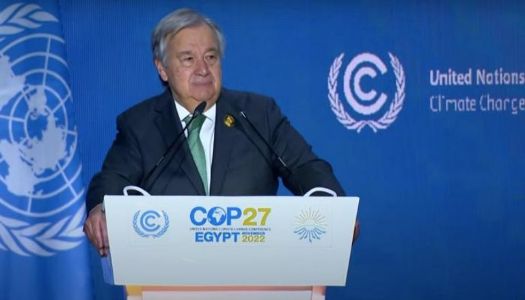
-
Published: 07 November 2022

Warning that the world is on the verge of a "mass suicide", and at the moment there is only one and only option is collective action to avoid the disaster, UN Secretary-General Antonio Guterres raised his voice loudly on Monday at the cop27 climate summit organized in Sharm el-Sheikh, Egypt
Guterres said in Sharm el-Sheikh, Egypt, that " humanity is faced with the choice of cooperation or destruction. Either it will be an era of climate solidarity or an era of mass suicide,"he said.
"We are taking the highway to climate hell and we keep pressing the accelerator pedal,"he stressed. Guterres has been raising his voice more and more recently.
Due to the urgent state of the climate, maximum pressure should be exerted on states to strengthen the fight against warming despite the "multifaceted" and interrelated crisis that is capturing the world's attention from the war in Ukraine, the energy and food crises, hyperinflation and the looming recession.
Guterres stressed that other crises are fleeting, but the climate is "a crucial issue of our time", and it is"unacceptable" that the struggle for climate is relegated "to the second place" in the ladder of priorities, stressing that this leads to "self-destruction".
In the same context, Egyptian President Abdel Fattah al-Sisi, host of the conference, said that "climate disasters are accelerating at an unprecedented pace and increasing their severity day after day, so soon as a disaster ends in one place until another begins elsewhere, leaving behind thousands of victims, displaced and injured".
"What our peoples expect from us today is rapid , effective and fair implementation," he stressed, but countries are still accused of falling short in what they should do to combat warming.
Greenhouse gas emissions should be reduced by 45% by 2030,to have a chance of achieving the most ambitious goal of the 2015 Paris Climate Agreement, which limits warming to 1.5 degrees Celsius compared to the pre-industrial era.
But the current pledges of the signatory countries, even if they are eventually respected, will lead to a rise in emissions by between 5 and 10%, putting the world on an upward trajectory of 2.4 degrees Celsius at best by the end of this century.
However, with current policies, the warming is expected to reach 2.8 degrees Celsius, which is catastrophic, according to the United Nations.
In this context, French President Emmanuel Macron said on the sidelines of the conference in Sharm el-Sheikh that he wants to "exert pressure" on "non-European rich countries", especially the United States and China, to pay their "share" in helping poor countries cope with climate change.
During a meeting with young people from Africa and France, Macron explained that "we must get the United States and China to really be on schedule" in the area of reducing greenhouse gas emissions and financial solidarity.
For the first time, the financial issue of losses and damages was officially included on the agenda of the cop.
These damages are estimated at tens of billions already and are expected to continue to rise significantly. The recent floods, which inundated a third of Pakistan, alone caused damage estimated at more than 30 billion.
Countries that are vulnerable to these repercussions are demanding a special financing mechanism, but rich countries are reticent about this, as they are afraid to be officially held responsible and report that the climate finance system is too complicated in its current state.
"We are pleased to extend an open invitation to everyone to cooperate in finding solutions that contribute to addressing losses and damage and creating sustainable growth opportunities for humanity everywhere,"said UAE President Sheikh Mohammed bin Zayed Al Nahyan at the conference.
However, cop27 will not lead to a decision on this matter as the negotiations are scheduled to continue until 2024, which displeases some activists who are demanding a decision during the current conference.
Trust in these files between the North and the South is almost non-existent after the rich countries failed to fulfill their obligations to provide a hundred billion dollars a year to the world's poorest countries to help them reduce emissions and adapt to the consequences of climate change.
Brazilian President-elect Lula, whose victory revived the hope of defenders of the Amazon, one of the "lungs" of the world, may visit Sharm el-Sheikh before the end of the conference on November 18.
Also coming is the new British prime minister Rishi Sunak, who will defend the energy transition and defend the performance of his country, which hosted the previous cop where the goals of the Paris Agreement were emphasized.
